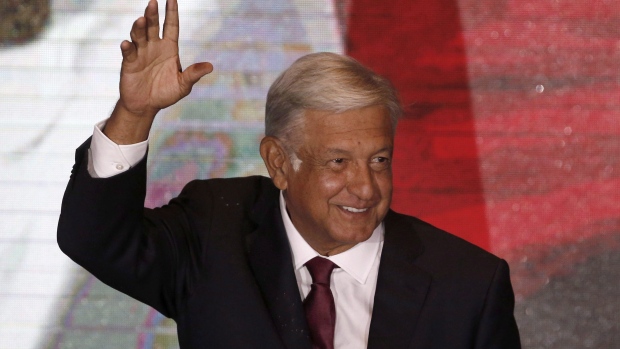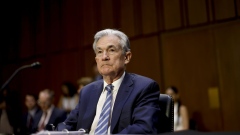Jul 2, 2018
Investors are right to take Mexican election in stride
, Bloomberg News

The anti-establishment wave has struck again – this time in Mexico, with the convincing election of Andres Manuel Lopez Obrador as Mexico’s new president. Well-signaled by the polls in the run up to Sunday’s voting, it’s an outcome that, unlike in the past, markets have been relatively sanguine about after an initial phase of worry. And they are likely to prove right as long as the global economy and its financial markets avoid major disruptions.
Described recently by the Financial Times as “a leftist nationalist with a sincere concern for the poor, a seductive message of renewal and a vivid sense of history,” President-Elect Lopez Obrador ran on an anti-establishment platform that promised to fight corruption, increase social spending, revamp state-owned enterprises, enhance national pride, and ensure that the economy delivers prosperity and security to more Mexican citizens. It was a message that – while still populist, nationalist and anti-elitist – was significantly toned down compared to his previous unsuccessful electoral campaigns. And it is one that gained a lot of traction in an age when trust has waned in traditional parties, the establishment and expert opinion.
Lopez Obrador also benefited from the insecurity that many Mexican feel because of the country’s external environment – a phenomenon that has already weakened asset prices and the currency. From questions about the future of Nafta to feeling increasing heat from Chinese competition, Mexico no longer views economic and financial globalization as a simple and automatic way to accelerate its domestic development process. Instead, international trade tensions and unstable cross-border fund flows are seen as sources of uncertainty and economic policy complications.
Needless to say, Lopez Obrador is not the first leader to ride to victory this wave of anti-establishment sentiment. It’s a phenomenon that has been playing out, over and over again, in both emerging and advanced countries. Indeed, this may be one of the reasons why, after an initial shake, markets have been rather sanguine about this election.
Unlike the turbulent run-up to Luiz Inácio Lula da Silva’s victory in Brazil in 2001 and to Alexis Tsipras’s in Greece in 2015 , Mexico has experienced relatively limited financial disruptions, capital flight or economic calamity. Risk spreads on bonds, while wide for the country’s credit rating, have been relatively contained. And the weakening of the currency has not been disorderly, especially when you take into account what has been taking place in this segment as a whole (let alone Argentina and Turkey). Indeed, it could well be because, in part, of Lula’s and Tsipras’s governing record – two firebrands that were thrust into power – that markets have been a lot more sanguine.
Nowadays, the dominating view in markets tends to be that, once in power, anti-establishment governments – be they from the left or from the right, are likely to be forced by reality to the center. This seems be particularly the case for what economists call small open economies – that is, economies that are highly reliant on international trade and capital flows, and that lack the domestic breadth and depth for any chance of success for inward-looking policies.
In this conventional view, the attempt by new anti-establishment governments to pursue heavily nationalist and populist agendas is seen, especially in emerging economies, to result in some unsustainable combination of currency meltdowns, ballooning borrowing costs, capital flight and growth contractions. And having seen this play out several times over history, most incoming governments are pre-emptively chastened.
But the Lula/ Tsipras outcome is not the only possibility. Lopez Obrador could revert back to the more aggressive tone he espoused in the past, raising concerns in markets about excessive fiscal outlays, large internal and external deficits, a disorderly currency and spikes in credit risk spreads. As such, markets will be paying particularly close attention to Lopez Obrador’s initial policy announcements, his approach to the state oil company Pemex, and his ministerial picks.
Alternatively, or in addition to that, Lopez Obrador could adopt the type of authoritarian approach that has become more evident in the emerging world, including by moving early to allow for re-election by seeking a change to the Sexenio rule that limits serving presidents to one six-year term. The extreme version of this is currently playing out – painfully – elsewhere in Latin America, where Venezuela is in the midst of huge economic impoverishment, shortages, hyper-inflation and social dislocations.
These alternatives notwithstanding, Lopez Obrador is indeed likely to govern using a center-left approach. Like Lula and Tsipras, this would combine increased emphasis on social spending and anti-poverty programs, with a relatively responsible fiscal stance, respect for the autonomy of the central bank, no major nationalization programs, no capital controls, retaining constructive interactions with foreign investors, and seeking to minimize disruptions to Mexico’s relations with its main trading partners.
But as the more recent experience of President Mauricio Macri in Argentina shows, this in itself may not be sufficient to protect Mexico from economic and financial instability. The country lives in an inherently more unsettled global and regional environment. As such, the economy will remain sensitive to uncertainties about its trading relations with the U.S., to the receding of global liquidity, and to the limited effectiveness of multilateral institutions in influencing economic policy alignments and coordination.
Moreover, a major external shock would most likely test the commitment of Lopez Obrador to the less extreme approach he has adopted for this election. It would increase the possibility of more inward-looking policies, both with respect to trade and to capital flows. And it would significantly amplify the pressure for more interventionist policies seeking to find shortcuts to delivering more inclusive growth at home.
Investors are right to respond relatively calmly to an election run-up that, in the past, would have been sure to cause market disruptions. But they should not become complacent in a world where Mexico also has to navigate considerable global and regional uncertainties.



